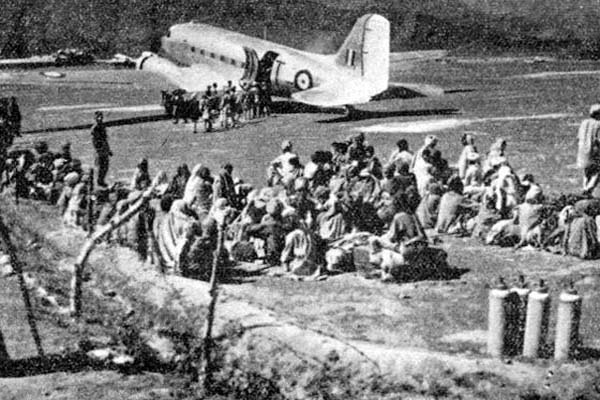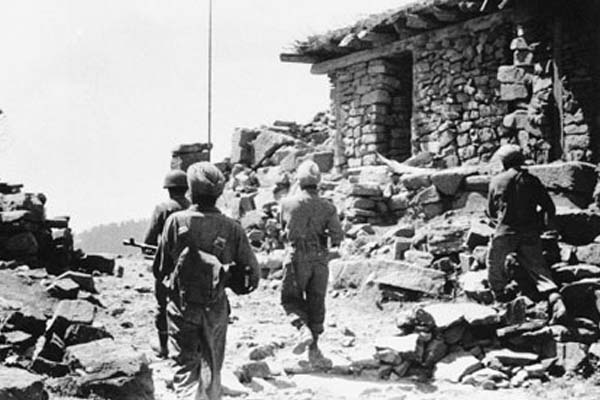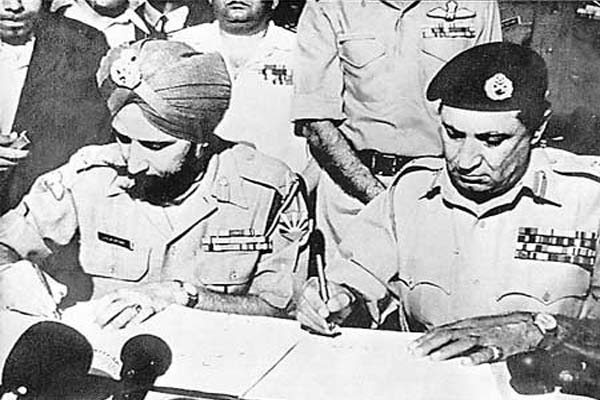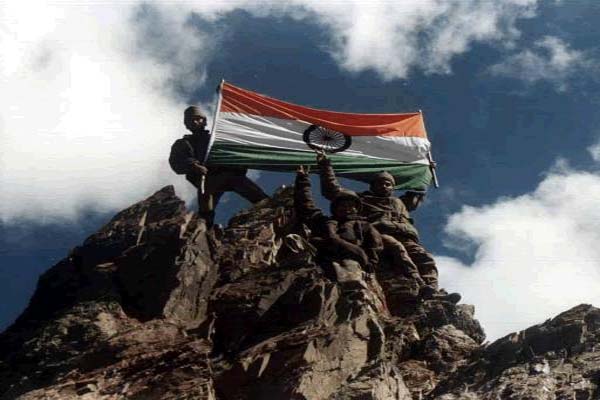Once an integrated India got partitioned in the year of 1947 on 14th August and a new country was born, Pakistan. The then ruler British Empire looked after the partition and northern part of the country was bifurcated. However, the relation between the two countries ever since has not been in good terms since the day one. They have fought serious wars on the fronts and ever going land dispute is still going on. There are many internal and external issues present in the two countries. However, fact of the matter is that there are multiple occasions when both the countries have faced each other in the border. Till now, four wars have been fought between the two countries officially and unofficially. There are many facts and matters associated with these wars and many of them you may not aware about. So, here are some interesting facts about the India and Pakistan War History that you must know.
Indo-Pak War in 1947
 This was the first instance of war between the two countries. Both of the countries were just independent but the partition and the division was still fresh in both sides of the borders. There are many Princely States in India who had the option to accede to any one of the countries or continue to function independently. Kashmir was one of them. However, both India and Pakistan wanted to have Kashmir in their territory. The Muslim populated Princely State Kashmir and Jammu was ruled by Hindu King Maharaja Hari Singh. However, Pakistan realized that Maharaja might go for the accession with India and Pakistan may miss out. The tribal forces of Pakistan then attacked Kashmir in order to gain the control which was still a Princely State. However, Maharaja immediately signed the accession with Dominion of India and Indian Army got into action. India pushed the Pakistani fighters from Central Kashmir to the northern and western part. However, by then the UN Security Council Resolution 47 was passed in 22 April, 1948. According to the resolution, international border was drawn between Kashmir with India having South, Central and Northeast part of the state and Pakistan got the administration right of the Northern and Western parts of the Kashmir. Both the country still claims the entire Kashmir and the tension persists in the Kashmir border. This war is also called as the First war of Kashmir.
This was the first instance of war between the two countries. Both of the countries were just independent but the partition and the division was still fresh in both sides of the borders. There are many Princely States in India who had the option to accede to any one of the countries or continue to function independently. Kashmir was one of them. However, both India and Pakistan wanted to have Kashmir in their territory. The Muslim populated Princely State Kashmir and Jammu was ruled by Hindu King Maharaja Hari Singh. However, Pakistan realized that Maharaja might go for the accession with India and Pakistan may miss out. The tribal forces of Pakistan then attacked Kashmir in order to gain the control which was still a Princely State. However, Maharaja immediately signed the accession with Dominion of India and Indian Army got into action. India pushed the Pakistani fighters from Central Kashmir to the northern and western part. However, by then the UN Security Council Resolution 47 was passed in 22 April, 1948. According to the resolution, international border was drawn between Kashmir with India having South, Central and Northeast part of the state and Pakistan got the administration right of the Northern and Western parts of the Kashmir. Both the country still claims the entire Kashmir and the tension persists in the Kashmir border. This war is also called as the First war of Kashmir.
Indo-Pak War in 1965
 India and Pakistan have been involved in many wars but after World War II, this was the heaviest battle fought on the borders. It all started when Pakistan started Operation Gibraltar in Jammu and Kashmir. It was aimed to infiltrate Pakistani Forces in order to create insurgency in India. However, India retaliated very strongly and attacked the Western Pakistan. It was a seventeen day hard fought war lasted between the two countries. The causalities crossed thousands on both side of the border and the bloodshed was increasing. Soviet Union (Now Russia) and United States of America, then intervened diplomatically to put a ceasefire between the two countries. The Tashkent Declaration was issued and the ceased fire officially took place. However, both the countries claimed the victory for themselves. The independent sources covering the war however majorly gave India the upper hand in the war of 1965.
India and Pakistan have been involved in many wars but after World War II, this was the heaviest battle fought on the borders. It all started when Pakistan started Operation Gibraltar in Jammu and Kashmir. It was aimed to infiltrate Pakistani Forces in order to create insurgency in India. However, India retaliated very strongly and attacked the Western Pakistan. It was a seventeen day hard fought war lasted between the two countries. The causalities crossed thousands on both side of the border and the bloodshed was increasing. Soviet Union (Now Russia) and United States of America, then intervened diplomatically to put a ceasefire between the two countries. The Tashkent Declaration was issued and the ceased fire officially took place. However, both the countries claimed the victory for themselves. The independent sources covering the war however majorly gave India the upper hand in the war of 1965.
Indo-Pak War 1971
 After 6 years, India and Pakistan were again standing against each other in the battle field. This is also the only war that did not involve the Kashmir issue. It was based on the political rivalries between Seikh Mujibur Rahman of East Pakistan and Yahya khan of West Pakistan. In the power tussle and in the difference in culture and language, East Pakistan declared independence from Pakistan. However, the Pakistan Force came into strong action and Operation Searchlight started. Plenty of East Pakistani were mercilessly killed. There were almost 10 million refugees in India at the time of war. India decided to be the part of the libration war of East Pakistan and soon it became the hostilities of the two old enemies. After hard fought battle, Pakistan surrendered to India with the 90000 army and civilians. This was the biggest surrender after the World War II. East Pakistan was carved out of the Pakistan system and People’s Republic of Bangladesh was formed. The fierce war which also known as the Liberation War of Bangladesh saw highest war prisoner after World War II as well. It is said that Pakistan lost almost half the Navy, quarter of the Air Force and one third of the Army in the battle. Total causalities of the war were very huge. The attack of West Pakistan to East Pakistan is often termed as Genocide in history.
After 6 years, India and Pakistan were again standing against each other in the battle field. This is also the only war that did not involve the Kashmir issue. It was based on the political rivalries between Seikh Mujibur Rahman of East Pakistan and Yahya khan of West Pakistan. In the power tussle and in the difference in culture and language, East Pakistan declared independence from Pakistan. However, the Pakistan Force came into strong action and Operation Searchlight started. Plenty of East Pakistani were mercilessly killed. There were almost 10 million refugees in India at the time of war. India decided to be the part of the libration war of East Pakistan and soon it became the hostilities of the two old enemies. After hard fought battle, Pakistan surrendered to India with the 90000 army and civilians. This was the biggest surrender after the World War II. East Pakistan was carved out of the Pakistan system and People’s Republic of Bangladesh was formed. The fierce war which also known as the Liberation War of Bangladesh saw highest war prisoner after World War II as well. It is said that Pakistan lost almost half the Navy, quarter of the Air Force and one third of the Army in the battle. Total causalities of the war were very huge. The attack of West Pakistan to East Pakistan is often termed as Genocide in history.
Indo-Pak War in 1999
 This is also called as the Kargil War. This was again old hostilities that took the form of war. Pakistani Forces and Kashmiri insurgents crossed the LOC (Line of Control) and occupied the area in Indian Territory. India took the aggressive approach and a massive military operation and diplomatic operation was taken. After the fierce war, United States had to pressurize Pakistan to withdraw the forces from Indian Territory. However, after Indian Army gained considerable position in the war and continuous pressure of United States, Pakistan withdrew the forces from Indian Territory. The war is also known as the Kargil War. The causalities again crossed thousands from both the sides. It was the last official war between the two countries.
This is also called as the Kargil War. This was again old hostilities that took the form of war. Pakistani Forces and Kashmiri insurgents crossed the LOC (Line of Control) and occupied the area in Indian Territory. India took the aggressive approach and a massive military operation and diplomatic operation was taken. After the fierce war, United States had to pressurize Pakistan to withdraw the forces from Indian Territory. However, after Indian Army gained considerable position in the war and continuous pressure of United States, Pakistan withdrew the forces from Indian Territory. The war is also known as the Kargil War. The causalities again crossed thousands from both the sides. It was the last official war between the two countries.
Even though India and Pakistan had fought four times, but the tension and hostilities between the two countries have remained all the time. The ceasefire is often broken at the LOC. Pakistan has also carried out many insurgent actions in Kashmir which they have officially denied. Both the countries blame each other for the tensions. Apart from war, there have been many high level talks as well between the diplomats and the high level ministers. However, no result has been yielded so far between them on Kashmir. Both the countries try to negotiate the demands and try to exchange words. However, ultimately they end up in sharing the bullets.